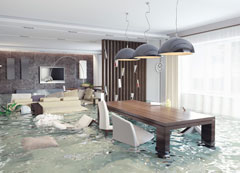Tips on how to protect your property from damaging floods
By Randy Hutchinson, President of the BBB (Reprinted from the Jackson Sun)
Flooding caused by recent heavy rains has forced people to evacuate their homes and schools to close. It prompted the Tennessee Department of Commerce & Insurance (TDCI) to issue an alert suggesting Tennesseans familiarize themselves with flood insurance coverage.
TDCI issued a similar alert after flooding in July 2016 resulted in a State of Emergency being declared. At the time, a study found that only 2.25 percent of residences in Memphis were covered by flood insurance, with the percentage even lower in other large cities.

The Federal Emergency Management Agency (FEMA) maintains a map that shows whether an area is at a low, moderate, or high risk of flooding. I checked it for Memphis and Jackson and, frankly, found it hard to understand. However, FEMA says that even if you live in a low or moderate risk area, you’re still five times more likely to experience flood than fire in the next 30 years. TDCI says 20 percent of flood insurance claims come from outside of high-risk flood zones.
TDCI says people should remember that where it can rain, it can flood. An inch of water in a home can cause more than $25,000 in damage.
Flood damage is not covered by a standard homeowner’s or renter’s policy. It’s usually purchased through an agent or insurer who participates in the National Flood Insurance Program (NFIP) at a cost that could be less than $400 per year. If NFIP insurance isn’t available in your area, ask your insurance agent about private insurance, although the market for it is relatively small.
NFIP policies have a 30-day waiting period to become effective unless the policy is bought at the same time as a newly purchased home.
TDCI offers these tips for what to do in the event of a flood:
- Have a plan. Learn the evacuation routes in your community. If you’re staying in your home during a flood event, go to the highest level of your home. If you’re outdoors, move to higher ground and take shelter, if necessary.
- Prepare your home. Move items you want to protect to a higher floor and prepare to turn off your electricity.
- Store your insurance information in a safe place. Regularly update your homeowner’s or renter’s insurance and maintain a home inventory to keep a record of your possessions. Also, keep track of records and receipts.
- Take pictures of any property damage. Try to prevent further damage by cleaning and drying wet items.
- Keep insurance agent and company contact information handy. Most insurance companies have a time requirement for reporting a claim, so contact your agent or company as soon as possible.
- Beware of fraud. Protect yourself by getting more than one bid from contractors and requesting references. Ask for proof of necessary licenses, building permits, insurance and bonding. Check them out with the BBB.
- Beware of flooded vehicle scams. After a flood, consumers should be alert for scammers who might disguise severely water-damaged vehicles as being perfectly good. A vehicle’s flood history may take 30 days or longer to post on reporting sites. The Tennessee Motor Vehicle Commission recommends that individuals purchase motor vehicles from a licensed motor vehicle dealer. Check them out with the BBB.
In This Issue...
- From the President
- Southwest ready to take flight as finalist in two of three SOAR award categories
- Southwest Community Relations Ambassadors luncheon is March 28
- Faculty and staff tout College’s growth at Spring Convocation
- Students’ passionate spirit and insight on display at recent Pizza with the President
- SACSCOC approves Funeral Service Education program
- Human Resources hosts inaugural pre-retirement seminar
- Southwest adopts new diversity statement
- New travel procedures should ease the process
- Farewell: Dr. Norma F. Parrish
- Thanks a million to Karen Nippert for 33 years of fundraising service
- College hosts TYCA-Southeast conference at Peabody Hotel
- Police Services/Public Safety Department selected as national award finalist
- Employee of the Month: Associate Director of Advising and Academic Support Ronald Claxton
- In honor of Women’s History Month: A salute to our ‘sheroes’
- How “Easy-Going” people are ultimately winning at life
- Staff Kudos: Millington Center Director Ron Wells selected for WestStar’s Leadership Program
- Welcome aboard, new team members
- ImagineU info session reveals rewarding, competitive entrepreneurship program
- Tips on how to protect your property from damaging floods
- Southwest Alumni Association accepting nominations for Alumnus of the Year
- Radiologic Technology program showcases new digital imaging equipment
- Project M.O.S.T. honors students at annual academic awards ceremony
- STUDENT NEWS: Skip the lines. Advise online!
- Career Services Corner: C.H. Robinson intern Roderick Jones lands position
- Southwest Saluqi basketball wraps up season with awards
- Southwest softball team starts season with best ever overall record
- Tennessee Small Business Development Center hosts SBDC Day for budding entrepreneurs March 20
- TSU offers full scholarship for transfer students
- Shelby County Schools host inaugural Senior Night at Southwest
- Southwest: In the News
- Civil rights legend Bertha Rodgers Looney honored with Share the Love Award